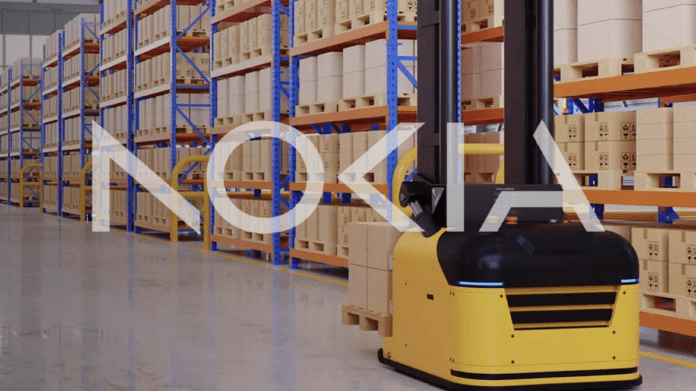Nokia has released the compact version of its Digital Automation Cloud (DAC) private LTE/5G product in Europe, pitching to small- and medium-sized industrial enterprises (SMEs) and the logistics industry, specifically. The firm started selling the solution, called DAC Compact, in the US in October last year for use in the shared/private 3.55-3.7 GHz CBRS band. It noted the spectrum landscape for private LTE/5G in Europe has expanded, with Italy, Finland, France, Germany, Netherlands, Norway, Poland, Spain, and the UK all with bandwidth for hire by enterprises.
On the logistics sector, it said its cut-down DAC Compact product, with a smaller footprint and shorter lead-time than its original micro-scale DAC and macro-sized Modular Private Wireless (MPW) LTE and 5G products, will solve “poor connectivity and automation challenges” in warehouses and micro fulfilment centres (MFCs). The Finnish vendor cited “reliable, secure, and [fast]” connectivity for autonomous guided vehicles (AGVs), handheld devices, industrial machinery, asset trackers, and sundry IoT sensors and cameras.
The SME market has always been the next major frontier for the nascent private LTE/5G market, marking its progress as an accepted and requested enterprise technology, and its breakout as a plaything for deep-pocketed multinational corporations. The SME market, typically defined to comprise firms with less than $100 million in turnover and fewer than 200 staff, makes up the lion’s share of the economic market. They account for over 95 percent of firms and up to 70 percent of employment, according to the Organisation for Economic Co-operation and Development (OECD).
Nokia quoted ABI Research, that the European logistics sector will be worth $1.05 trillion in 2024, and $1.32 trillion by 2029, growing at a compound annual rate (CAGR) of 4.69 percent during the period. It stated: “The logistics market… is undergoing a major transformation due to the rise of e-commerce and consumer demand… [But] the logistics market in Europe is projected to lose $1.03 billion of revenue in 2024 due to failing connectivity, caused by using legacy Wi-Fi networks that are not fit for purpose for the high levels for automation and mobility in warehouses.”
Nokia suggested its DAC Compact product can increase industrial “cycle time” (productivity; the time it takes to complete a specific task) by up to 25 percent and decrease energy by 60 percent versus equivalent Wi-Fi deployments, as well as slash other operational costs. The solution is available on subscription (as-a-service) via Nokia’s reseller channels. It is being offered with its Mission-Critical Industrial Edge (MXIE) compute blades, to host enterprise data and a roster of home-grown and third-party Industry 4.0 applications.
Stephan Litjens, vice president of enterprise solutions at Nokia, said: “As digital transformation takes hold within a wider range of industries where security, scalability, productivity and efficiency are much needed, Nokia DAC PW Compact offers the capabilities of our MXIE, simplifies industrial digitalisation of small-medium size businesses and will help to accommodate the growing and changing needs of the logistics market in Europe.”

